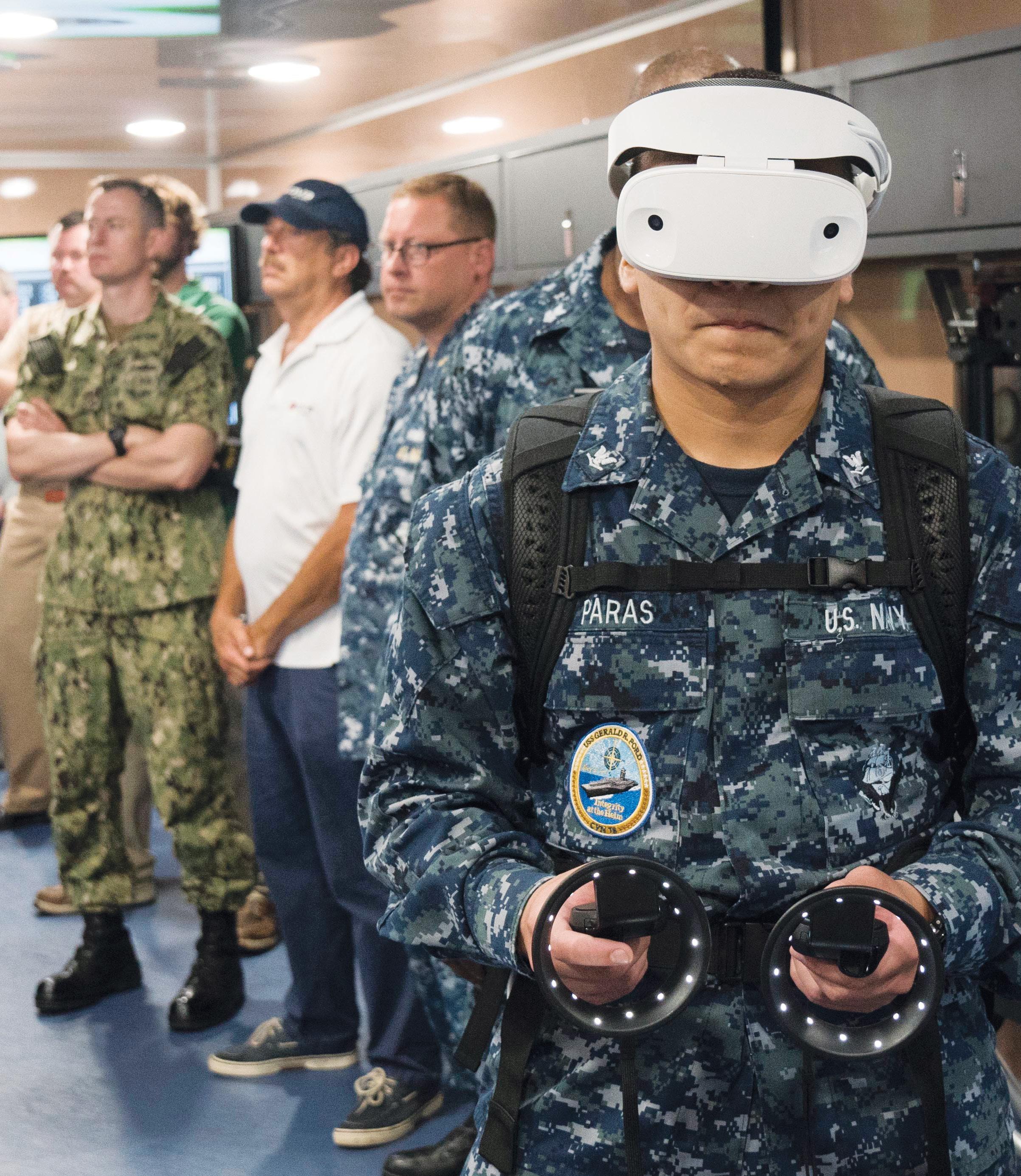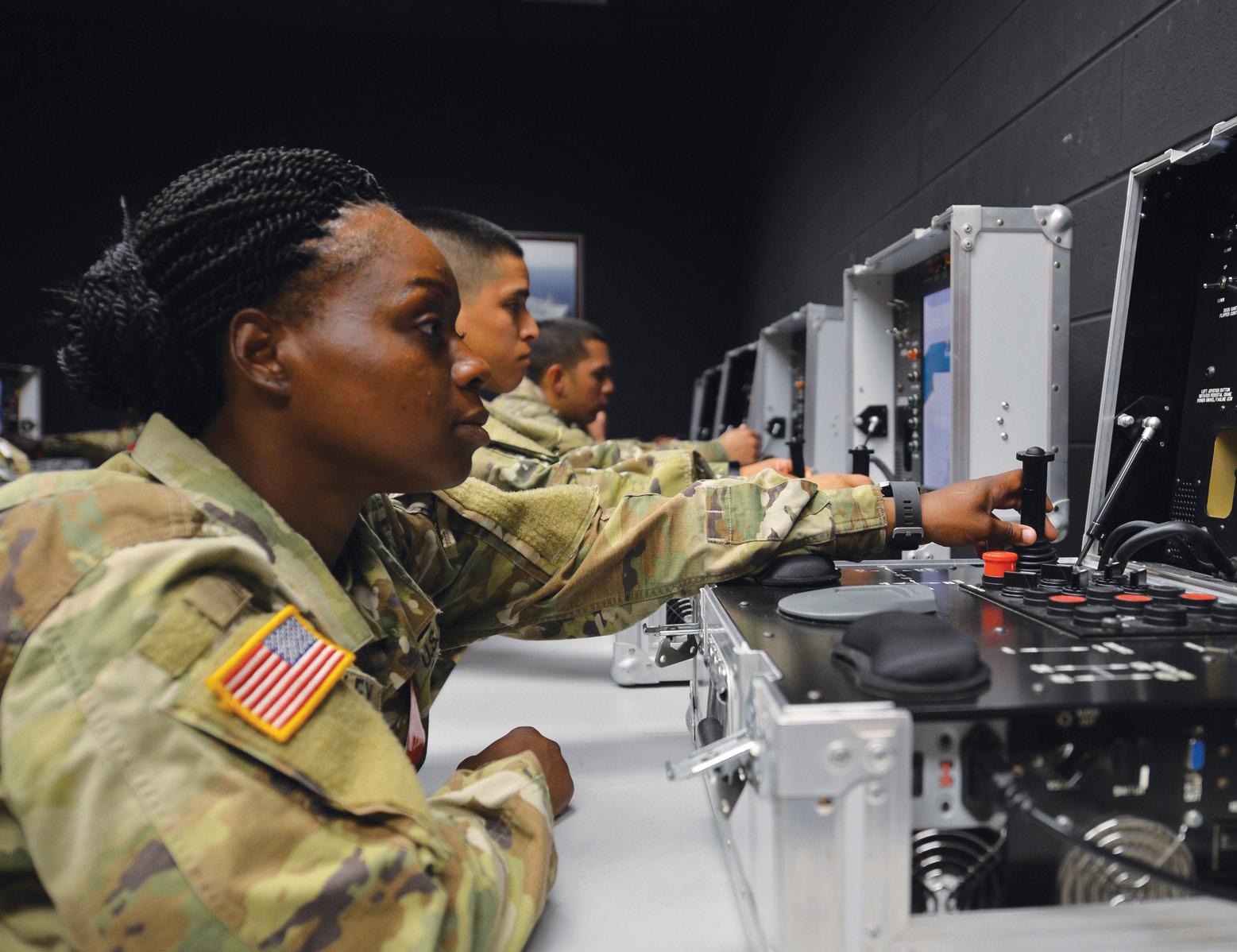
15 minute read
The Appian Way: A Conversation With Matt Calkins
The App ian Way
A Conversation With Matt Calkins
Matt Calkins is founder and CEO of Appian, an enterprise cloud software company headquartered in McLean in Fairfax County. Calkins is a California native who founded Appian in 1999 and grew it into a publicly traded company. Appian is a leader in low-code automation, which enables organizations to develop powerful business applications quickly. VEDP President and CEO Stephen Moret spoke with Calkins about building and running a software company headquartered in Northern Virginia.
Stephen Moret: Could you tell us a bit about the backstory on Appian? What led you to found the company and take it in the direction it’s going?
Matt Calkins: We’ve been building Appian for 22 years. No plan survives 22 years, but from the beginning, I wanted to build an organization that contributed both financially and culturally. It was very important to me that we’d be a member of the community and a good part of the lives of those who came into contact with us.
We’re a low-code provider, which means we’re a software company that allows our customers to build applications without using much code. It’s the new way of building applications. We’re facilitating and pioneering the new concept of low-code so that organizations can create new software quickly.
Moret: What led you to base Appian in Northern Virginia? And how has Appian benefited from that decision? Calkins: I came here right out of college. I started the business here with three friends who also lived in Virginia. We’ve never had our headquarters outside of a tight circle here in Northern Virginia. All of our code is developed here. All of our board members are from this region. All of our funding came from this region. I feel like Appian is a testament to what’s possible in Northern Virginia. We have the necessary components — the experts, the funding, the very smart employees, the great education, and the transportation. We’re a hub. We’re a center of smart people. Northern Virginia has everything you’d ever need to build a great company.
Moret: When we talk about the tech sector, the dominant factor of interest by far in where things begin, where things grow, is talent. It’s that collection of smart people you talked about. How has Appian had success in recruiting tech talent to Northern Virginia, or in Northern Virginia?

MATT CALKINS Founder and CEO, Appian
Calkins: It does have the second-highest number of IT professionals in the United States, just after Silicon Valley, but most of those IT professionals are not private-sector software engineers. We don’t traditionally have a giant software sector, but we are seen as a place where it’s possible to do software work and to build a software company. It’s also a place where ambitious, energetic people would like to go. This is a region in the United States that can attract that kind of talent, which helps us a lot.
You said a moment ago that talent was the No. 1 determiner of whether a region could host a growing startup software company. That actually might be changing. It’s possible that the location of talent is less important in a virtual age, so perhaps a local culture of investment that nurtures those companies might actually become more important.
Moret: I read that at one point you personally vetted every new hire at Appian. I assume that isn’t the case anymore, but how do you think that helped Appian in its early years, and how do you think that’s shaped the way you think about recruiting talent to Appian?
Calkins: Yes, I did. It was very important to me to personally interview all the candidates we hired because I felt from the beginning that culture was going to be the most important factor here, and I wanted to be sure we were accumulating a consistent culture — one that I wanted. I looked for a certain kind of a person. I didn’t think I could delegate that. Secondly, it expressed my respect to each candidate. By making myself available to speak to them even in the process of getting a job at Appian, there is an implicit signal that they could speak to me later, too. I want to be open to comments. It created a very open culture where no one felt daunted to approach me because they’d all spoken to me already. I still try to encourage Appian to have an open culture where anybody can share their thoughts and disagree with anybody else.
I think a company’s DNA is determined by the first 1,000 or so people it hires. Our cultural DNA was just so important to me. Besides, we plan on growing a lot more, so whatever hiring decisions we make now and whatever culture we implicitly endorse are going to be multiplied as we grow. I want to be sure we get the initial model just right. For a long time, I considered one of the most important things in my job to do hundreds of interviews a year. Now I regret that I can’t do that many.
Moret: What do you see as the future of Northern Virginia as both a tech hub and as a location for other corporate headquarters? And what role do you think individual companies can play in helping to develop a sustainable tech workforce in the region?
Calkins: The transition I would most like to see Virginia make in terms of its software business is to be less of a satellite and be more of a headquarters. I’d like to have more Virginia-headquartered software companies. I know we’ve got talent here, but let’s not have all that talent work for somebody else’s firm. Let’s have some of them work for Virginia firms. We’ve got good ones, and many of us are striving to build more good ones. Given the talent of our workforce, we should expect to have our share of flagships and not just satellites.
Moret: Appian was at the forefront of the tech sector’s focus on low-code — offering existing building blocks of code to businesses to help get apps online more quickly. I think you’d agree that’s been a big driver of your success and growth. Can you elaborate on the benefits of that approach and how you see it evolving in the future?
Calkins: Low-code means drawing an application like a flowchart instead of coding it line by line. It makes an organization much faster to define its own patterns. It’s maybe 10, or even 20 times faster and, as such, it’s helping organizations to be agile and self-defined. It’s empowering them to be themselves.
Lately, organizations have never needed to be themselves more. They’ve never needed to react faster to change. This has all been a big test of our ability to change. There’s never been as much demand for corporate agility, and it’s been fascinating to be right in the middle of that.
Appian is a leader in the low-code market. We were the first company to go public as a low-code firm. We’re right in the middle of it. I love that, because it means we’re not just running a business, we’re pioneering an idea. We’re creating this concept and trying to deliver value through the concept.


Board games Calkins has designed

Moret: Think about the last year for a moment. Obviously, it’s been an interesting and rather challenging year for most companies because of the pandemic. How has it impacted Appian, as well as your role as CEO?
Calkins: For Appian, it was a turning point that strengthened us. We figured out early on that we had strengths to spare, which is to say our business was virtualized pretty easily. We had the platform that was perhaps the world’s fastest way to build a new application. We saw the world struggling to adopt new patterns of behavior. Here we were, at once able to sustain our patterns and also possessed of an ability that others needed, and so we immediately turned our strengths outward and tried to help others.
We created an application that would manage COVID risk and keep people safe inside an organization. We gave it away. It was the most popular launch we’ve ever done. We had more than 1,000 companies download it. It was fulfilling to be able to use our strength in the midst of a crisis to help others.
Moret: One of the most interesting things I learned about you was that one of your chief hobbies, when you’re not running Appian, is board games — not just playing them, but also designing them — and I think doing both at a competitive level. What appeals to you about gaming?
Calkins: I’ve loved board games since I was about two years old. They always fascinated me. I like complexity, competition, and things that simulate history or real-world situations. All of these things draw me to board games. I like playing them competitively, partly because they give you excellent feedback. They teach you whether you’re doing well or doing poorly.
I like designing them because it trains me to take a complex real-world situation, like the war that unified Japan in the 1600s, and boil it down to a few important mechanisms that can be a good game. I think that’s a great exercise I enjoy very much. It’s about reducing a situation and then building rules and identifying causal relationships. Those are exactly the same activities you should be doing when running a company.
Moret: You’ve been here a long time in Virginia. What are your favorite places to visit in the Commonwealth?
Calkins: First, I love to hike. I’m a backpacker, so of course I like the Shenandoah Valley. There are a number of other places to hike around Virginia. The second top thing my love of history. This is a state full of early American history, from the colonies and the Revolution to the Civil War. It’s just teeming with historical sites. All those sites mean more if you do a little research and understand the background.
Moret: Matt, we’re so grateful for you making time to visit with us. Is there anything else you’d like to share about Appian or Virginia?
Calkins: I’m proud of the way we’ve been able to grow for 22 years in Virginia. We’ve seen a lot change and had a good partnership with Virginia throughout. I feel like this region has given us everything we needed in order to be a successful firm. It’s always been my goal for us to be a contributing member of the community. I’m proud that we’re getting to the size where we can start doing that. It’s been a great partnership. I appreciate all that you and your colleagues have done to make this a great place to do business.
For the full interview, visit www.vedp.org/Podcasts
We have chosen Fairfax County, considered the East Coast center of technology innovation, for its proximity to the nation’s capital, a vibrant business community, access to several international airports and Metro’s Silver Line, and an incredibly diverse and highly educated workforce.
MICHAEL SAYLOR CEO, MicroStrategy

Tysons in Fairfax County was a rural farming community until the 1960s. The construction of the Capital Beltway, Dulles International Airport, and the mall that became Tysons Corner Center kicked off a period of explosive growth that transformed the area into a major employment center with more than 100,000 jobs.

U.S. Navy Machinist’s Mate 3rd Class Nolan Paras demonstrates virtual reality training software at Cape Henry Associates in Virginia Beach.
From Boots to the Boardroom

Virginia’s veterans are a natural fit for corporate headquarters
VIRGINIA IS HOME to 30 military installations and more than 721,000 veterans. It’s also home to 36 Fortune 1000 companies (eighth among U.S. states) and 2,300 corporate headquarters operations (seventh). Veterans are well suited to transition from boots to the boardroom, and many who serve in the state want to stay.
According to the U.S. Department of Defense, 21,210 service members separated from military service in Virginia in fiscal 2019, second-most in the country behind California. Last year, WalletHub ranked Virginia No. 1 for veterans looking to retire, based on healthcare facilities, quality of life, and the Commonwealth’s strong economy.
“It’s a win-win-win. The veteran wins, the corporation wins, and the community wins,” said Vonzell Mattocks, executive director of the Veteran Employment Initiative at the Northern Virginia Technology Council.
Their mix of technical and soft skills make veterans a great choice for employers, and the Commonwealth has recognized the workforce asset veterans represent and taken steps to enhance that advantage.

VETERANS AND VIRGINIA: A PERFECT MATCH
The same strengths that make Virginia a great state for business make it a great fit for service members. The marriage of the Commonwealth’s diverse economy and its military footprint come together on the map. Virginia’s three major economic hubs of Hampton Roads, Northern Virginia, and the Richmond MSA are each anchored by large military installations.
Northern Virginia is home to the Pentagon, Fort Belvoir, Marine Corps Base Quantico, and Joint Base MyerHenderson Hall. Fort Lee is south of Richmond, near Petersburg. And Hampton Roads is home to more than 82,000 active-duty military across seven naval installations (including Naval Station Norfolk, the world’s largest naval base), two U.S. Army bases, four U.S. Coast Guard installations, a U.S. Marine Corps Forces Command, and Langley Air Force Base. Veterans exiting military service from these installations depart with a diverse range of professional skills and expertise, from logistics and cybersecurity to force protection and program management. In addition to professional qualifications, soft skills reign supreme for service members.
“Veterans are going to be on time, stay until after the buzzer, and be there until the job is done,” said Kenneth Lyles, Virginia Values Veterans (V3) regional program manager, Northern Virginia. “It’s basically muscle memory.” For Virginia companies, it often comes down to dollars and cents, as well — hiring veterans can help a company’s bottom line. “You’re going to save on training costs. You’re going to save on clearances. We come to work on time,” said Lyles, who served in the U.S. Marine Corps as a military policeman. “We’re good decision-makers.”
“If you’ve got 40,000 employees, your most important lever with your employees is how good are you at the craft of leadership,” said Mike Petters, CEO of Newport News-based Fortune 500 shipbuilding company Huntington Ingalls Industries. “And veterans bring that experience with them in a way that a lot of other parts of our society just don’t.”
Naval Station Norfolk
Naval Station Norfolk


A CULTURE MATCH
The military culture itself aligns well with a corporate headquarters environment, where good judgment and professional values are vital. That culture is one of the reasons CACI International, Inc., a professional services and information technology company headquartered in Arlington County, has made a commitment to veteran hiring, with veterans or military members comprising 37% of its workforce (including military spouses, National Guard, and reserves).
“The reason we are doing all of this is because of the great value that veterans and military bring to CACI and to our customers,” said Gary Patton, vice president of veteran and military affairs at CACI. “We recognize and appreciate the leadership, the self-discipline, the training, the work ethic, the integrity and, in many cases, the security clearance they bring to our company. They enrich our company with all of those values and attributes, in addition to their experience and their skill sets, and they help make us successful in supporting our customers in the national security space.”
For a company like CACI, with a significant portfolio of government and military customers, hiring veterans just makes good business sense. Patton says he couldn’t imagine the company without its veteran population. “It’s part of our culture, it’s part of our DNA, and it’s ingrained in everything we do.”
Mattocks notes that a lot of desirable qualities which aren’t easily vetted in a traditional interview process generally shine in the veteran community.
“A person who has volunteered to serve probably brings some soft skills that we don’t often talk about — their honor, valor, integrity,” Mattocks said. “We don’t use that in common terms or in an interview question, but veterans possess that highest level of commitment and the courage to say, ‘Hey, I don’t know that’ — the courage to be truthful. That brings trust pretty fast, and that’s critical for any organization.”
Veterans are an obvious fit for the defense industry, where security clearances are often required and knowledge of government culture is a plus. But Virginia businesses are creating innovative programs to help attract and retain qualified veterans.
Jack McCarthy, a military recruiter at Goochland County-based auto retailer CarMax, estimates that 10% of his company’s hires each year are veterans, and he believes that number will rise based on the company’s work with organizations like the U.S. Chamber of Commerce’s Hiring Our Heroes. In February, Alarm. com, headquartered in Fairfax County, began the second year of its G.R.I.T. apprenticeship program for veterans. The apprenticeship is a one-year paid program that provides full employee benefits, including on-the-job and classroom training and industry certifications.
The Virginia government also offers programs to help veterans find post-military employment. For example, the V3 program is a free training and education program operated by the Virginia Department of Veterans Services. To date, V3 has helped more than 79,000 veterans get hired. The organization offers a free certification program to help employers attract and retain veterans.
WILL WORK FROM ANYWHERE
With the COVID-19 pandemic continuing to affect the workforce, veterans are ready to stand out in corporate offices in other ways — by showing up and getting the job done regardless of their office location.
“In the virtual environment, you have less supervision than in the direct, live office space, and veterans make great employees,” Patton said.
Cultivate
When we look at supporting former military as they come into civilian life, it’s a great starting point for someone who has leadership skills, great work ethic, good people skills, and can develop technical abilities and ultimately set their own career path.
KEVIN MURPHY CEO





